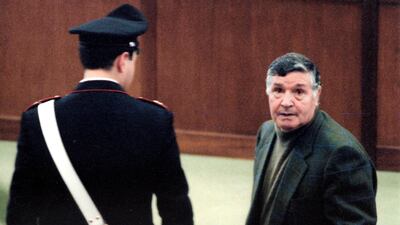Salvatore ‘Toto’ Riina, the most feared and savage of Sicilian mafia bosses, died peacefully of natural causes on Friday; it was a fate none of his victims ever had the good fortune to enjoy. During his decades-long reign of terror, the 87-year-old had ordered the deaths of dozens of people, and oversaw a criminal empire that encompassed heroin trafficking, extortion and political assassinations.
Riina, who died in the prison ward of a hospital in Parma, in northern Italy, had been serving 26 life sentences for homicides committed between 1969 and 1992. His victims included the two magistrates who led the campaign to bring mob bosses to justice, magistrates Giovanni Falcone and Paolo Borsellino.
He fell into a coma after complications during surgery a few days ago, and his family had been given special dispensation to be by his side on Thursday, the Italian justice ministry said.
Nicknamed ‘The Beast’, Riina began his violent criminal career on the streets of Corleone in Sicily after the Second World War, and led the island’s mafia during its most powerful period of the 20th century.
He oversaw a flourishing economic period for the Cosa Nostra – ‘Our thing’ in Italian – when it was trafficking heroin to the eastern United States and pulling the levers of political power in Palermo and Rome.
But due to Riina’s savagery, hundreds of mobsters broke their code of silence in the 1980s and 1990s and testified against him, allowing Falcone and Borsellino to uncover the long-hidden secrets of the organisation and prosecute its leaders for the crimes of its soldiers.
Riina’s January 1993 arrest, after more than 20 years as a fugitive, came just months after Falcone and Borsellino were blown up by car bombs on his orders, and coincided with a tumultuous downfall of Italy’s post-war political system.
Under Riina the organisation developed close relations with corrupt senior politicians from most of the major political parties – including with cabinet ministers and allegedly prime ministers. The deaths of the two crusading magistrates unleashed a wave of massive public disgust which swept the old order away.
Since his arrest, Riina has been held under high security with little access to his family in accordance with a law written to prevent bosses from commanding from prison. However, he remained a powerful figure within the mob even behind bars and refused to cooperate with investigators until the end.
Matteo Messina Denaro, a Riina ally who has been a fugitive for 25 years, is the highest-ranking boss still at large, but it is unlikely he will be able take power according to John Dickie, a British historian and author of the book Cosa Nostra.
“Cosa Nostra is internally and politically divided in a way that makes it almost ungovernable, and this division dates back to Riina’s campaign for power in the 80s,” Mr Dickie said.
Riina's surviving foes within Cosa Nostra had close ties to North America, and they are the ones most likely to seek a shift in the crime syndicate’s balance of power.
“Because the Sicilian Mafia is struggling, it needs to renew its access to the United States, which has been crucial to the organisation since the 1880s,” added Mr Dickie.

